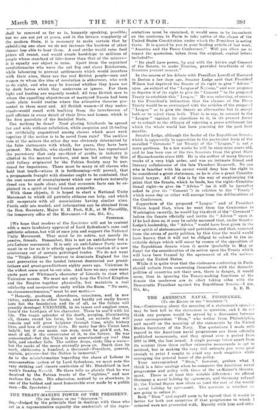THE TREATY-MAKING POWER OF THE PRESIDENT. (To two EDITOR or
roe " Sinecure."' Sui,--Judged by the principle that in dealings with those who act in a representative capacity the oredentials of the repre- sentatives must be examined, it would seem to be incumbent on the conferees in Paris to take notice of the clause of the United States Constitution under which the President is acting there. It is quoted by you in your leading article of last week, "America and the Peace Conference." Will you aliens me to repeat the quotation, taken from the original, capital letters included ?—
" He shall have power, by and with the Advice and Consent of the Senate, to make Treaties, provided two-thirds of the Senators present concur."
In the oouree of his debate with President Lowell of Harvard in Boston a few days ago, Senator Lodge said that President Wilson bad deprived the Senate of its right to give " Advice " upon .se subject of the " League of Nations," and now proposes to deprive it of its right to give its " Cement " to the proposed Treaty to establish this " League." He was referring, of course, to the President's intimation that the clauses of the Peace Treaty would be as enwrapped with the articles of the proposed "League" as to give the Senate no alternative but to aceslet both or to reject them both. That is to say, to consent to the " League " (against its objections to it, in its present form) Or to submit to the obloquy of rejecting a pence settlement for which the whole world has been yearning for the past four months.
Senator Lodge, although the leader of the Republican Senate. which is apparently its opposition to the particular form of the so-called " Covenant " (or Treaty) of the "League," is not mere partisan. In a few weeks he will be sixty-nine years old, and he hue been one of the two Senators from the great State of Massachusetts since 1893. He is the author of many literary works of a very high order, and was an intimate friend and literary collaborator of the late Theodore Roosevelt. No one who is familiar with his career would deny him the right to be considered a great statesman, as he is also a great Constitu- tional lawyer. All of this is by the way of emphasizing the point that the Senate, which be leads, has the right—Constitee Hanel right—to give its " Advice " (as it will be hereafter asked to give its " Consent ") in relation to the "Treaty " which some day or other will emerge from the deliberations of the Conference.
Supporters of the proposed "League" and of President Wilson hoped that, when be went from the Conference to Washington recently, he would lay the draft of the" Covenant" before the Senate officially and invite its " Advice" upon it. If he had done so, it may he eafely assumed that, under Senator Lodge's leadership, the "Advice" would here been given in the true spirit of etateentanehip and patriotism, and that, removed from the arena of party politics, by this time the world would have known that it will not be obliged to submit to the in- evitable delays which will occur by reason of the opposition of the Republican Senate when it meets (probably in May or June) for the consideration of its action upon the Treaty which will have been framed by the agreement of all the nations except the United States.
While it is quite true that the statesmen conferring in Paris should refrain from concerning themselves with the domestic polities of countries not their own, there is danger, it would seem, that in ignoring the Treaty-making functions of the Senate the conferees are in effect taking sides with the Democratic President against the Republican Senate.—I am,


































 Previous page
Previous page